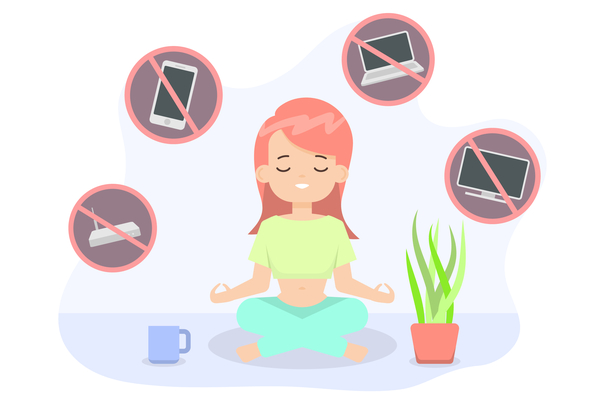Many of us spend hours a day in front of a screen. Shouldn’t it be joyful? Unfortunately, it isn’t always so easy. Prolonged screen time disrupts sleep and gives us a big hit of dopamine, often called the “feel-good” neurotransmitter — so much of it that if you go overboard, your body could compensate by making less of your own. Scrolling through social media can add the harmful impacts of comparison, unrealistic standards and the spread of misinformation.
It is no surprise to many of us that research on smartphone usage reveals high correlation rates of depression in adults. Smartphones not only lead to depression, they also lead to a form of addiction across generations. In short, social media and mental health are connected. At the end of the day, there are relatively few human beings in sections of today’s world with access to technology, who are not attached to their phones as if they are another limb.
We are in an age of detoxes; cleanse diets are in, from keto to juice, to bone broth, so why not add a social media cleanse to your pre-summer diet list?
Take for example, two social media giants: Facebook and Instagram. In-house researchers at these companies study the perfect time to release the “like” to us mere mortals. Meaning that even if someone has liked our photos, the companies have a special formula aiding them in knowing the perfect moment to reveal the “likes” to us, so the feel good hormone, dopamine, hits at just the right time.
The process is called a dopamine-driven feedback loop, and it’s some scary stuff because it is the reason we refresh our screen fifteen times in thirty seconds to see if we have any new likes. We keep refreshing the screen because our brain craves the satisfaction of seeing the like so our brain can release dopamine, making us happy again—at least for a couple of seconds. In short, the programmers are programming us.
On some level, we all know the pictures we see of friends and via influencer accounts are only the highlight reels of those lives. Somewhere deep down we are aware that this can’t be real life; that they too have their own daily struggles. But even though we know that in our core, at the forefront we still compare ourselves to these counterparts—wishing we were on that adventurous hike, working that amazing job, constantly happy hour-ing with cool(er) friends, at that beachfront resort, dating that perfect partner, eating those delicious-looking street tacos. The scientific research says this is a real phenomenon called “social comparison” and “feedback seeking” and it actually leads to depression. The same study also found social media actually influences who we think is “popular.”
This is all a roundabout way to say social networking sites affect our well being both qualitatively and structurally, meaning they alter our brain chemistry, leading to increased levels of stress and anxiety. Social media is even proven to make us feel more lonely, but the inverse is true too, less social media means less of those feelings. One academic article thoughtfully titled “No More FOMO,” claims limiting social media use makes us less lonely and less depressed. No FOMO, no loneliness, and no depression? Where do we sign up?
Right here, with this handy ten-step “How to Detox from Social Media” plan, thanks to the website, blood & milk:
Here are some helpful tips if you want to try your hand at a social media detox, but be warned it can be hard stalking new friends or potential love interests without a handy dandy instagram handle.
- Admit you have an unhealthy relationship with your social networking apps. If you need to be convinced go check your phone log for how many hours a day you spend on Instagram, Facebook, or Snapchat. Two hours or more a day? You may be dependent.
- Delete the apps from your phone. Make it a challenge. Try doing it for two months. Incentivize yourself with a reward, like a cookie or some ice cream, or put them together and make it an ice cream sandwich.
- Don’t redownload them.
- STILL DON’T REDOWNLOAD THEM. Even when you “ just have to check one little thing.”
- After a week of slowly weaning yourself off the apps, now try deactivating your Facebook account. Keep it deactivated for a month. See how you feel. If you’re brave try deactivating your Instagram and your Facebook account at the same time. Plan some activities, you’re going to have a lot of free time.
- Deactivate your Instagram account (and Snapchat account). The key is working yourself up to these steps slowly. It took me six months to get rid of my social networking accounts, I started with Snapchat, then Instagram, and finally Facebook.
- Keep your accounts deactivated for at least a month. Pick a month where nothing exciting happens—that’s a joke, something exciting is always happening—keep them deactivated anyway.
- When you really want to find out what your friend is up to or how their vacation is going, text them for pictures. Relish in how it feels to be social media free. Remember a simpler time, like fifteen years ago, when you didn’t have a smartphone. Now you finally understand what they mean when they say “the good ol’ days.”
- Redownload, and approach your accounts more mindfully. Try to limit your social media time to 10 minutes a day, or an hour a week, or if you’re brave an hour a month. There are now locks on your phone you can set for these kinds of things. Offtime, Flipd, AppDetox(only on Android) are great options.
- Detox again whenever you need to. Or if it felt too good to be true, just detox forever.
—
Photo Credit: digitaldropicon / Shutterstock.com
